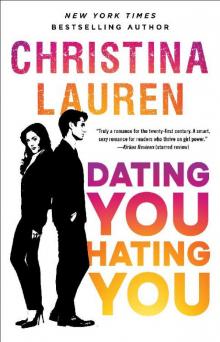- Home
- Christina Lauren
Sweet Filthy Boy Page 9
Sweet Filthy Boy Read online
Page 9
God, I want to make this better.
About five minutes later, his hand goes slack, and then slides dully away from mine, heavy with sleep. Maybe if I’d given him more notice—or if I’d let him talk more the first night we met—he would have been able to tell me how much he hates to fly. Maybe then he would have been able to tell me he took something to help him sleep.
The cabin lights dim and both men beside me are dead asleep, but my body seems to be unable to relax. It’s not a normal feeling, being wound up like this. It’s a bit like having a fever, being restless in my own skin, unable to find a comfortable position.
I pull out the book I blindly shoved into my carry-on; unfortunately, it’s the memoir of a famous female CEO—a graduation gift from my father. The cover alone—a photo of her standing in a sensible suit against a stark blue background—does nothing to settle my sour stomach. Instead I read every word of the airplane safety insert and SkyMall in the seat pocket in front of me, and then steal the airline magazine from Ansel’s pocket and flip through it.
I still feel like hell.
Pulling my legs up, I press my forehead to my knees, turn my air up as far as it will go. I try to breathe deeply, but nothing seems to help. I’ve never had a panic attack before, so I don’t know what one feels like, but I don’t think it’s this.
I hope that’s not what this is.
It’s only when the flight attendant hands me a menu, and both options—salmon or tortellini—make my stomach revolt, that I realize what I’m feeling isn’t just nerves. It isn’t even the renewed rearing of my hangover’s head; this is something else. My skin is hot and oversensitive. My head swims.
The food is wheeled into the cabin, the smell of salmon and potatoes and spinach so pungent and thick that I’m gasping, stretching on my seat to get closer to the thin stream of cool air. It’s not enough. I want to escape to the bathroom, but immediately know I won’t make it. Before I can wake Ansel, I’m frantically digging in the seat pocket in front of me for the airsickness bag, barely getting it open before bending over and violently hurling inside.
It doesn’t get any worse than this moment right here, I’m sure of it. My body is in charge, and no matter how much my brain tells it to be quiet, to throw up like a proper lady—fucking quietly—it won’t. I groan, feeling another wave hit me, and beside me Ansel comes awake with a jerk. He presses a hand to my back and his sharp “Oh, no!” brings my humiliation fully to the surface.
I really can’t let him see me like this.
I push to stand, tripping over him before he has time to get out of his seat and practically falling into the aisle. I’m getting looks from other passengers—looks of shock and pity and disgust—but they should just be glad I managed to hold on to my bag of vomit when I launched myself into the aisle. Even though I have to concentrate fully on walking as I trip down toward the bathroom, in my head I’m glaring back at them. Have they ever been sick on a plane full of five hundred people, including their new stranger-husband? No? Then they can shut the hell up.
One small mercy is the empty lavatory just a few rows up and I shove the door open, practically collapsing inside. I throw away the bag in the tiny garbage can and crumple to the floor, bending over the toilet. Cold air blows up into my face, and the deep blue liquid in the bowl is enough to make me retch again. I’m shivering with fever, involuntarily moaning with every exhale. Whatever bug I have came on like a train barreling down the track and hitting a building full speed.
There are moments in life where I wonder whether things can get worse. I’m on a plane, with my new husband, whose enthusiasm for this whole thing seems to be flagging, and it’s in this deep moment of self-pity that I register—with absolute horror—that I’ve also just started my period.
I look down at my white jeans and stifle a sob as I reach for some toilet paper, folding it and shoving it into my underwear. I push to stand and my hands are jerky and weak when I pull my hoodie off, tying it around my waist. I splash some water on my face, brush my teeth with my finger, and almost gag from it, my stomach rolling in warning.
This is a nightmare.
A quiet knock lands on the door, followed by Ansel’s voice. “Mia? Are you okay?”
I lean against the tiny counter as we hit a small batch of turbulence and the effect inside my body is magnified. I nearly pass out from the sensation of my stomach dropping in air. After a beat, I open the door a crack. “I’m okay.”
Of course I’m not okay. I’m horrified, and if I thought I could escape from the plane by crawling into this toilet, I might try.
He looks worried . . . and drugged. His eyelids are heavy, his blinks slow. I don’t know what he took to sleep, but he was only out for about an hour, and he weaves a little as if he might fall over. “Can I get you anything?” His accent is thicker with his drowsiness, his words harder to follow.
“Not unless you have a pharmacy in your carry-on.”
His brows pull together. “I have ibuprofen, I think.”
“No,” I say, closing my eyes for a beat. “I need . . . girl things.”
Ansel blinks slowly again, confusion making his brow furrow further. But then he seems to understand, eyes going wide. “Is that why you’re throwing up?”
I nearly laugh from the look on his face. The idea that I would suffer a period and throw up every month seems to horrify him on my behalf.
“No,” I tell him, feeling my arms start to shake from the effort it’s taking to stand. “Just a fabulous coincidence.”
“You don’t . . . have anything? In your purse?”
I let out what has to be the heaviest sigh known to man. “No,” I tell him. “I was a little . . . distracted.”
He nods, rubbing his face, and when his hand is gone he looks more awake, and resolute. “Stay here.”
He closes the door with a determined click, and I hear him call to a flight attendant. I sink down onto the toilet seat, resting my elbows on my knees and my head in my hands as I listen to him through the door.
“I’m sorry to bother you but my wife,” he says, and then pauses. With the last word he says, my heart begins to hammer. “The one who now got sick? She’s started her . . . cycle? And I’m wondering if you keep any, or rather if you have . . . something? You see this all happened a bit fast and she packed in a hurry, and before that we were in Vegas. I have no idea why she came with me but I really, really don’t want to screw this up. And now she needs something. Can she, uh,” he stutters, finally saying simply, “borrow quelque chose?” I cover my mouth as he continues to ramble, and I would give anything in this moment to see the expression of the flight attendant on the other side of this door. “I meant use,” he continues. “Not to borrow because I don’t think they work that way.”
I hear a woman’s voice ask, “Do you know if she needs tampons or pads?”
Oh God. Oh God. This can’t be happening.
“Um . . .” I hear him sigh and then say, “I have no idea but I’ll give you a hundred dollars to end this conversation and give me both.”
This is officially the worst. It can only get better than this.
AND YET. THERE are no words for the humiliation of being pushed in a wheelchair through customs to baggage claim and sitting in the middle of Charles de Gaulle, holding an airsickness bag up to my face in case I lose the two sips of water I’ve managed in the past hour. The world feels too bright and bustling, rapid-fire French squawks in sharp bursts from loudspeakers all around me. After an eternity, Ansel comes back with our luggage and the first thing he asks is whether I’ve thrown up again.
I tell him he should just put me on a plane headed back to California.
I think he laughs and says no.
He spills me into the back of a cab before climbing in after me and speaking in a burst of French to the driver. He’s speaking so fast I’m sure there’s no way anyone
can understand him, but the driver seems to. We lurch from the curb, and take off at an unreal speed from the beginning. Getting out of the airport is all jerks and starts, acceleration and swerving.
Once we get into the thick of the city, and buildings rise and loom above narrow, curved streets, it’s harrowing. The cab driver doesn’t seem to know where his brake pedal is but he sure knows his horn. I curl into Ansel’s side, trying to keep what’s left of my stomach from crawling up my throat. I’m sure there are a million things I want to see from the window—the city, the architecture, the vibrant green I can almost feel in the light coming into the cab—but I’m shaking and sweaty and barely conscious.
“Is he driving a cab or playing a video game?” I mumble, barely coherent.
Ansel laughs quietly into my hair, whispering, “Ma beauté.”
In a beat, the world stops churning and jerking and I’m pulled from the seat, strong arms behind my knees and around my back, under my arm, lifting me.
Ansel easily carries me into a building and directly into a tiny elevator. He waits as the cabbie pulls our bags behind him and shoves them in with us. I can feel Ansel’s breath on my temple, can hear the gears of the lift taking us higher and higher.
I turn into him, my nose in the soft, warm skin of his neck, relishing his smell. He smells like man and ginger ale and the tiny remnant of soap from so many hours ago, since he showered clean of me in the hotel room.
And then I remember: my present smell must be revolting. “I’m sorry,” I whisper, turning my head and trying to pull away, but he squeezes me, saying, “Shh,” into my hair.
He struggles to find his keys in his pocket while carrying me, and once we’re inside, he sets me down on my feet and it’s only now that my body seems to get permission to respond to the cab ride: I turn, crumple to my knees, and throw up whatever water I have in my stomach into the umbrella bucket near the door.
Seriously, it is not possible for my humiliation to grow.
Behind me, I hear Ansel lean back heavily against the door before he slides down behind me, pressing his forehead to my back just between my shoulder blades. He’s shaking with silent laughter.
“Oh my God,” I groan. “This is the worst moment in the history of ever.” Because it is, and it turns out my humiliation can grow plenty.
“You poor girl,” he says, kissing my back. “You must be miserable.”
I nod, trying—but failing—to pull the bucket with me when he lifts me around my ribs.
“Leave it,” he says, still chuckling. “Come on, Mia. Leave it. I’ll take care of it.”
When he lays me down on a mattress, I’m barely aware of the light, the smell of him everywhere. I’m too incoherent to be curious about his apartment but I make a mental note to look around and compliment it as soon as I no longer want to die. I add this task to the to-do list where I also thank him profusely, and then apologize, and then get on a plane and fly back to California in mortification.
With a small pat to my back, he’s gone and almost immediately I fall fast asleep and have intricate, fevered dreams about driving through dark, narrow tunnels.
Beside me, the mattress dips where he sits and I jerk awake, knowing somehow it’s been barely a minute since he left.
“Sorry,” I groan, pulling my knees to my chest.
“Don’t be.” He puts something down on a table near the pillow. “I’ve put some water here. Approach it with caution.” I can still hear the smile in his voice, but it’s easy, unmocking.
“I’m sure this isn’t how you pictured our first night here.”
His hand smooths over my hair. “Nor you.”
“Probably the least sexy thing you’ve ever seen,” I babble, rolling into the warm, clean Ansel smell of the pillowcase.
“‘Least sexy’?” He repeats with a laugh. “Don’t forget I biked across the United States with sweaty, dirty people.”
“Yeah, but you never wanted to have sex with any of them.”
His hand stills where it’s gently rubbing my back, and I realize what I’ve just said. It’s laughable, this assumption that he will ever touch me sexually again after the past fifteen hours. “Sleep, Mia.”
See? Proof. He called me Mia, not Cerise.
I WAKE UP to morning of some bright, unknown hour. Outside there are birds and voices and trucks. I smell bread, coffee, and my stomach clenches, quickly protesting that I’m not ready for food yet. And as soon as I remember the day before, a hot wave covers my skin; whether it’s embarrassment or fever, I have no idea. I kick off the covers and see that I’m dressed only in one of his T-shirts and my underwear.
And then I hear Ansel in the other room, speaking English. “She’s sleeping,” he says. “She’s been very sick, this past day.”
I sit up in response to the words, but I’m thirstier than I’ve ever been in my life. Grabbing the glass of water on the bedside table, I lift it to my lips, drink it in four long, grateful swallows.
“Of course,” he says, closer now. He’s just outside the door. “Just a moment.”
His feet quietly pad into the room and when he sees that I’m awake his face cycles through relief, then uncertainty, then regret. “In fact, she’s already awake,” he says into the phone. “Here she is.”
It’s my phone he’s handing me, and the display tells me my father is on the line. Ansel covers the receiver briefly, whispering, “He’s called at least ten times. I’ve charged it, so fortunately . . . or not,” he says with an apologetic smile, “you have plenty of battery left.”
My chest aches, stomach twisting with guilt. Pressing the phone to my ear, I manage only, “Dad, hi. I—” before he cuts me off.
“What the hell is wrong with you?” he yells, but doesn’t wait for a reply. I pull the phone a few inches from my ear to relieve the pain of his shouting. “Are you on drugs? Is that what this Ansel person means when he says you’re sick? Is that your drug dealer?”
“What?” I blink, my heart pounding so fast I’m terrified that I’m going to have some sort of cardiac event. “Dad, no.”
“Who other than a druggie flies to France with no warning, Mia? Are you doing something illegal?”
“No, Dad. I—”
“You’re unreal, Mia Rose. Unbelievable. Your mother and I have been worried sick, calling constantly for the last two days!” The rage in his voice comes through as clear as if he’s in the next room. I can just imagine how red his face is, lips wet with spittle, hand shaking where he grips the phone.
“You’ll never get it. You’ll never get it. I just hope your brothers do better when they’re your age.”
I close my mouth, close my eyes, close my thoughts. I have the vague sense of Ansel sitting down beside me on the bed, his hand rubbing soothing circles on my back. My father’s voice is booming, always authoritative. Even if I pressed the phone flat to my ear I know Ansel would be able to hear every word. I can only imagine what he said to Ansel before I got on the line.
In the background, I can hear my mother’s pleading voice murmuring, “David, honey, don’t,” and know she’s carefully trying to pry the phone away. And then her voice is gone, muffled voices behind his hand over the receiver.
Don’t, Mom, I think. Don’t do this for me. Defending me right now isn’t worth the days of silent treatment followed by more days of snide, underhanded insults.
Dad returns to the line, his voice heated and sharp as a knife. “You do realize, Mia, that you are in a world of trouble. Do you hear me? A world. If you think I’m going to help you move to Boston after this, you’re delusional.”
I drop my phone on the mattress, Dad’s voice still hurtling through the line, but the glass of water I’ve had doesn’t want to stay down. The bathroom opens off Ansel’s bedroom, and I’m tripping across the room, falling onto my knees in front of the toilet, and now not only do I have to suf
fer the humiliation of having Ansel hear my father berate me on the phone, but he gets to watch me throw up. Again.
I try to pull myself up so I can go wash my face, fumbling to find where I’m supposed to push to flush the toilet and failing, falling to the side in exhaustion and landing on the cool tile.
“Mia,” Ansel says, bending one knee beside me, rubbing my arm.
“I’ll just sleep here until I die. I’m pretty sure Harlow will send one of her manservants to retrieve my body.”
Laughing, he lifts me into a sitting position and then tugs his shirt up and over my head. “Come on, Cerise,” he murmurs, kissing just behind my ear. “You are burning up. Let me put you in the shower and then we are going to the doctor. I worry. You are making me worry.”
THE DOCTOR IS younger than I expect: a female in her thirties with an easy smile and reassuring competency with eye contact. While a nurse takes my vitals, the doctor speaks to Ansel and, presumably, he explains what’s going on with me. I catch only when he says my name, but otherwise have to trust that he’s relaying everything accurately. I imagine it goes something like, “The sex was great and then we got married and now she’s here! Help me! She won’t stop throwing up, it’s incredibly awkward. Her name is MIA HOLLAND. Is there a service by which we ship wayward American girls back to the States? Merci!”
Turning to me, the doctor asks me some basic questions in broken English. “What are the symptom?”
“Fever,” I tell her. “And I can’t keep any food down.”
“What is your highest, ah . . . temperature before you come here?”
I shrug, looking at Ansel. He says, “Environ, ah, trente-neuf ? Trente-neuf et demi?” I laugh, not because I have any idea what he’s just said, but because I still have no idea what my temperature is.
“Is it possible you are pregnant?”
“Um,” I say, and both Ansel and I laugh. “No.”
“Do you mind if we do an exam and take some blood?”

 Love and Other Words
Love and Other Words Autoboyography
Autoboyography Dating You / Hating You
Dating You / Hating You Beautiful Player
Beautiful Player Beautiful Bombshell
Beautiful Bombshell Beautiful Stranger
Beautiful Stranger Beautiful Bastard
Beautiful Bastard Beautiful Secret
Beautiful Secret The Unhoneymooners
The Unhoneymooners Beautiful Beloved
Beautiful Beloved Sweet Filthy Boy
Sweet Filthy Boy Dark Wild Night
Dark Wild Night Roomies
Roomies Dirty Rowdy Thing
Dirty Rowdy Thing The House
The House Beautiful Bitch
Beautiful Bitch Beautiful Beginning
Beautiful Beginning Josh and Hazel's Guide to Not Dating
Josh and Hazel's Guide to Not Dating Beautiful Boss
Beautiful Boss In a Holidaze
In a Holidaze Wicked Sexy Liar
Wicked Sexy Liar Twice in a Blue Moon
Twice in a Blue Moon Sublime
Sublime Beautiful
Beautiful Beautiful Boss (Beautiful #9)
Beautiful Boss (Beautiful #9) Wicked Sexy Liar (Wild Seasons #4)
Wicked Sexy Liar (Wild Seasons #4)